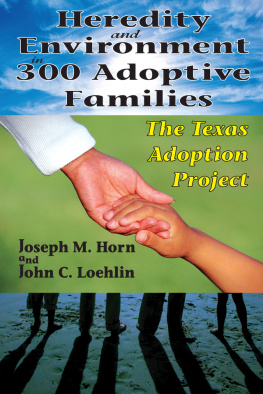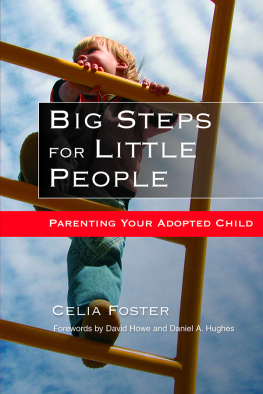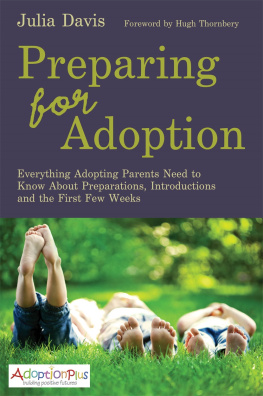Heredity and Environment in 300 Adoptive Families
Heredity and Environment in 300 Adoptive Families
The Texas Adoption Project
Joseph M. Horn
and
John C. Loehlin
First published 2010 by Transaction Publishers
Published 2017 by Routledge
2 Park Square, Milton Park, Abingdon, Oxon OX14 4RN
711 Third Avenue, New York, NY 10017, USA
Routledge is an imprint of the Taylor & Francis Group, an informa business
Copyright 2010 by Taylor & Francis.
All rights reserved. No part of this book may be reprinted or reproduced or utilised in any form or by any electronic, mechanical, or other means, now known or hereafter invented, including photocopying and recording, or in any information storage or retrieval system, without permission in writing from the publishers.
Notice:
Product or corporate names may be trademarks or registered trademarks, and are used only for identification and explanation without intent to infringe.
Library of Congress Catalog Number: 2009023281
Library of Congress Cataloging-in-Publication Data
Horn, Joseph M.
Heredity and environment in 300 adoptive families: the Texas adoption
project / Joseph M. Horn and John C. Loehlin.
p. cm.
Includes bibliographical references and index.
ISBN 978-0-202-36345-5
1. Adoption--Texas--Case studies. 2. Parent and child--Texas--Case studies.
3. Parents--Texas--Case studies. I. Loehlin, John C. II. Title. III. Title:
Heredity and environment in three hundred adoptive families.
HV875.56.T4 H67 2010
362.73409764--dc22
2009023281
ISBN 13: 978-0-202-36345-5 (hbk)
Contents
Guide
This book describes a thirty-five-year study of three hundred families who adopted a child from a Texas home for unwed mothers during the years 1963 to 1971. (These children are thus now adults.) The study was initiated and directed by Joseph M. Horn, at the time a fresh young University of Minnesota PhD on the Psychology faculty of the University of Texas at Austin. He soon recruited two of his colleagues, John Loehlin and the late Lee Willerman, to assist him in the study. The rest, as they say, is history.
The present book sketches the history of the project and brings together its many findingscurrently scattered through various articles in professional journalsplus a few hitherto unpublished results reported here for the first time. We conclude with a discussion of the implications of these findings for two groups of people: first, for those directly concerned in one way or another with adoptions; and second, for those of ussurely most of uswho wonder from time to time about the differences among the individuals around us. This is because an adoption study lets us separate the two things that parents provide children: their genes and their family environments. In adoptive families, one set of parents provides the former and another set of parents provides the latter.
We have tried to write this book so as to make it accessible to general readers. For this reason, we have minimized the number of direct citations in most parts of the textif present, they take the form of (authors surname, date), which should let you find them in the reference list at the back of the book if you wish. Otherwise, notes at the beginnings of chapters provide sources for material covered in that chapter. The book contains many numerical tables, but we have tried to keep them simple, and have provided an introduction to them at the beginning of . Finally, there is a glossary of technical terms at the back of the book, preceding the references.
It remains in this preface to acknowledge the many people and institutions who have contributed in one way or another to this particular scientific enterprise.
First, and most critical, are the members of the three hundred adoptive families that participated in the study. Although for reasons of confidentiality we cannot name them, we want to assure each participating member of each one of the families that we deeply value the time and effort that he or she contributed to the project.
Next, we are grateful for the institutional support we have received. The original study was financed by the National Institute of Mental Health, through its grant MH2480. The separate mail study and the ten-year follow-up were supported by the National Science Foundation, through grants BNS7902918 and BNS8209882. Later phases of the project were supported by the Pioneer Fund. We are grateful to its presidents Harry F. Weyher, Jr., and J. Philippe Rushton for their help. Our institutional home, the Psychology Department of the University of Texas at Austin, has supported us and continues to support us in many ways. And finally, the Methodist Mission Home of San Antonio has played a central and essential role in the research. We are grateful to its three successive presidents, Spencer Stockwell, Harold Burkhardt, Jr., and Larry Watson for their wholehearted support of the study. In particular, without Dr. Stockwells foresight in gathering data on the birth mothers, this book would simply not exist. We are also grateful to the Homes consulting psychologist, Arthur G. Bouton, who contributed in a major way to the testing; and to many members of the Methodist Mission Home staff, including Lillian Smith, Bertha Cardwell, Bea Pearce, Dorothy Johnson, Mona McDonald, Mildred Miller, and others, who helped in contacting the adoptive families, providing data from the files, and in other ways.
Many individuals at the University of Texas played important roles in the project. Administrative Assistants Carol Weegar and Carol Shirley worked successively to keep things moving; later, Jody Ernst took on that task in addition to doing her dissertation work on the project and carrying out some of the home interviews. Many graduate students in the Psychology Department were involved in the project at one time or another; among those (in addition to Jody) were Richard Arnold, Jeremy Beer, Richard Bouton, Ralph Carney, Marilyn Erickson, Mary Green, Nancy Lawson, Ashleigh Merritt, Marsha Peterson, Gerald Turner, and David Vaughan. Finally, a number of undergraduate research assistants participated in various ways, including data entry, assistance with mailings, and rating of interviews. Among these were Jennifer Clemens, Jessica Cundiff, Eliot Davis, Cindy Fong, and Jeane Yo.
In addition, we are grateful to the numerous psychologists across the state who assisted with the testing of the families. In addition to Arthur Bouton from the Methodist Mission Home, they include Kyle Babick, B. R. Barrington, Philip Dunbar, Alan Fisher, Richard Fullbright, Kathy Galvin, Neil Holliman, Jan Lander, Bert Levene, Barbara Leventon, Charles Mahone, Beatrice Matheny, Charles Middleton, Linda Montoya, Robert Nicholson, Nick Norton, Herb Stewart, William Whitehead, and Douglas and Shirley Winslow.
On a more personal level, we thank our wives, Joan and Marj, and our children, Tom and Karen, and Jennifer and James, for their tolerance and support throughout the long days and years of the project.
Finally, we would like to dedicate this book to the memory of Lee Willerman, a superb colleague and brilliant idea man, whose name, were he still with us, would be on its title page.
JMH & JCL, 2009
A Brief History and Overview of the Project
This book is an account of a thirty-five-year research project involving three hundred families, each of whom adopted at least one child at birth from a Texas home for unwed mothers, the Methodist Mission Home of San Antonio. The book weaves together (1) information about the birth parents of the adopted children, gathered by the Home prior to the birth of the child in question; (2) information about the adoptive parents, gathered by our research team early in the study; and (3) information about the children in these familiesthe adopted child and othersgathered by the project at several points during their lives until adulthood.







